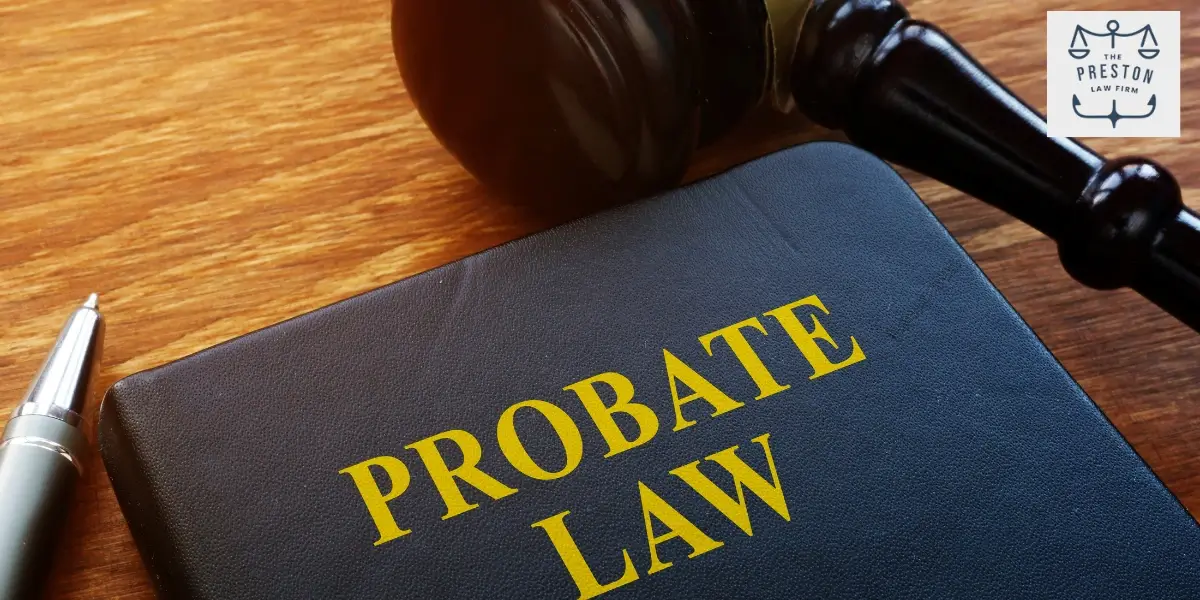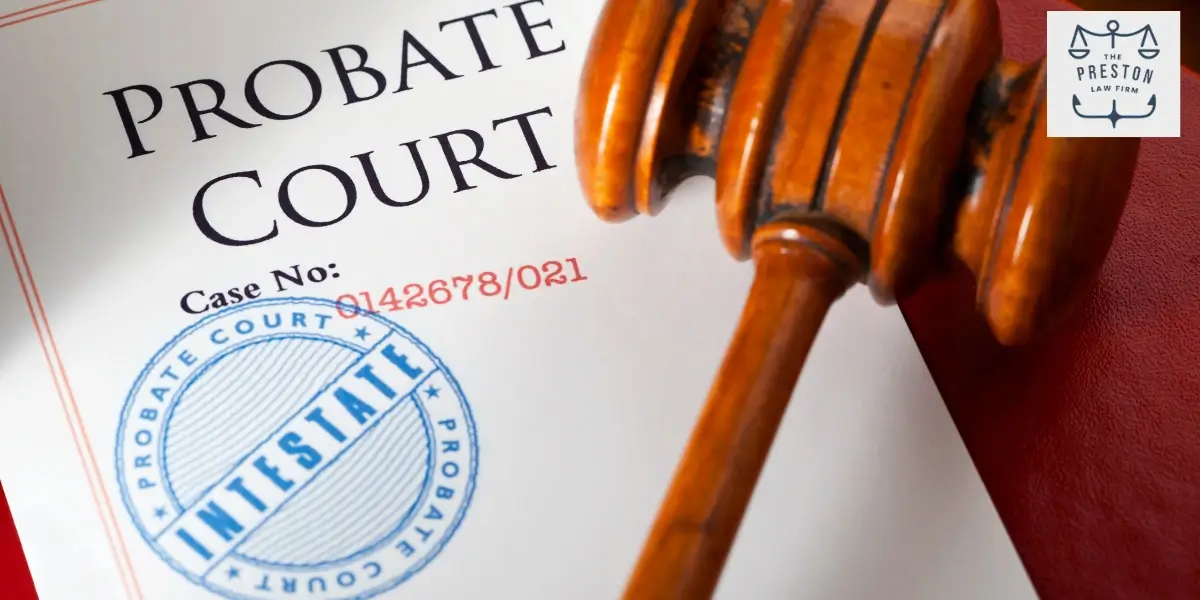Edgewater Probate Attorney
Probate is the legal process of managing a deceased person’s estate once it enters the state’s jurisdiction. While necessary, it can be stressful and emotional for families. An experienced Edgewater probate lawyer can ease the process, ensuring your loved one’s wishes are honored and guiding you through probate administration, whether you are an heir or a personal representative.

Experienced Probate Lawyer in Edgewater
At The Preston Law Firm, our team has over 35 years of legal experience in probate law and estate planning. We have helped manage and close many estates in probate administration, both straightforward and complex. If there are faster ways to settle an estate, we help you understand the options and their benefits.
We have an in-depth understanding of the process of probate, from initial filing, asset inventorying, and settling debts to distributing assets and closing the estate. We provide compassionate support during this difficult time in your lives, guiding you through the probate process so you and your loved ones can focus on grieving and healing.
Whether you are an executor or personal representative unsure of your responsibilities, or an heir navigating probate court, we can guide you through the process, ensure you fulfill your duties, and protect your interests.
What Is Probate and Why Is It Challenging?
Probate is the legal process in which the state validates the will of a deceased person and distributes their assets accordingly. The process ensures debts are paid, assets are all accounted for, and the estate is distributed before it is closed. The probate process, from filing a petition to closing the estate, can vary in duration based on factors such as the estate’s value and the complexity of its assets.
Probate is an important process to settle estates but is challenging for family members and beneficiaries. Probate court is a serious legal process that can take a lot of time and occurs at the same time that loved ones are dealing with their own grief. There are also numerous court costs and legal support fees that must be paid, and this can cut into the benefits of the estate that beneficiaries receive.
The process can become more complicated and stressful if there are contests to the will or other disputes raised by beneficiaries or family members. This can also lengthen the process considerably.
Probate is also frustrating because beneficiaries cannot receive their assets until the estate has closed. The time and stress of probate can become even more frustrating when combined with financial challenges.
The Preston Law Firm
Experience the Difference. Choose an Estate Planning Law
Firm Dedicated to You and Your Family.
What Complicates Probate?
Probate can become more complicated and take longer to resolve for reasons such as:
- The estate has significant assets
- There is no estate plan or will
- There are numerous beneficiaries listed in the will
- There are numerous heirs under intestate inheritance law
- The will is contested
- There are contests against the ability and duties of the executor or personal representative
- Property in the estate is under litigation
- There are disputes between family members or beneficiaries
- Numerous court dates are required to settle the estate
An attorney is required to go through the probate process, but it is especially important and helpful to work with an skilled attorney who provides comprehensive legal support in these cases. You want an attorney who understands how to navigate these complex issues efficiently.
What Is the Process of Probate?
Probate may be handled differently depending on the circumstances and needs of the estate but will typically include the following steps:
-
- Filing with the court: This includes notifying the court of the deceased’s death and submitting their will or stating that there is no will. The probate court will then validate the will. If there is a valid will, then the executor named in the will is placed in charge of administering the estate.
If there is no executor named, the will is determined invalid, or there is no will, the court will appoint an individual as the personal representative, such as a family member, trusted friend, or professional associate of the deceased.
- Notifying beneficiaries and creditors: The executor must inform all beneficiaries or heirs to the estate of the deceased’s death and the beginning of probate. They must also inform all known creditors and take steps to inform unknown creditors. This must follow a specific process, and creditors must be given a certain period of time to make their claims against the estate.
- Gathering and inventory assets: During this time, the executor should review the assets in the deceased’s estate, properly inventorying and ensuring all are accounted for. This also includes evaluating the assets. Assets in an estate include bank accounts, personal property, and real estate.
- Paying debts, taxes, and expenses: Once the creditor claims period has closed, the executor must pay all valid creditor claims, as well as the expenses of the estate during the probate process and the tax returns required for the estate and its assets. The executor will submit a statement to the probate court listing all assets, expenses, and income of the estate.
- Managing disputes: If there are any challenges to the will or other types of contests during the process, they must be settled before the estate can be finalized and distributed.
- Distributing assets: Once all these aspects have been handled, the executor distributes the assets according to the will’s wishes or the state’s laws of intestate inheritance.
- Closing the estate: After the distribution of assets, the executor files the final information with the probate court and then can close the estate.
These steps are complicated and must be completed in the right legal time frames and in a specific order. Working with an attorney is necessary, but it is also beneficial during this complex process. An attorney understands these requirements and legal expectations. If you are an executor, an attorney can ensure you meet the duties of your role and limit your own liability during the process.
How Can an Estate Avoid Probate?
The costs and stressors of probate court are significant, and avoiding probate can be helpful for your estate and your loved ones. However, if the deceased did not plan ahead, then heirs can only avoid probate if the estate is under a certain value and qualifies for summary administration. This is still a probate process, but it is a simplified process.
Individuals can also plan ahead to avoid probate through comprehensive estate planning. Using estate planning tools like irrevocable and revocable trusts, pay-on-death designations, and other tools is helpful for avoiding probate.

FAQs
How much a probate lawyer costs in Edgewater, Florida will depend on several factors, including:
- Whether the estate qualifies for formal probate or for summary administration
- The attorney’s education, experience, and abilities in probate administration
- The attorney’s fee structure
- The location of the attorney’s firm
- The complexity and size of the estate
- How long the estate is expected to take to close
- Whether the estate or will is contested
Yes, you need a lawyer to go through probate in Florida. It is a legal requirement for personal representatives in most cases to be represented by an attorney. There may be exceptions for small estate administration. Working with an attorney is also incredibly beneficial for navigating the complex legal process of probate. This process is especially frustrating when you are dealing with the loss of a loved one, and the support of a knowledgeable probate attorney can help immensely.
The probate process can be very complex in Florida and may require multiple court dates to resolve. Several costs cut into the benefits of the estate and can take a lot of time. Probate takes even longer if the estate has complex or high-value assets or if there are any contestations.
Smaller estates may be able to follow a summary administration process, which is faster, but the process is still lengthy. An attorney can make probate go more smoothly.
An estate could be settled without probate in Florida in one of the following situations:
- The estate is valued under a certain amount and, therefore, qualifies for small estate administration, which is a streamlined form of the probate process
- The deceased did not have any qualifying assets when they died
- The individual used estate planning tools, such as trusts, pay-on-death, transfer-on-death, and beneficiary designations, to prevent their estate from entering probate
Navigating Probate Court With Experienced Legal Support
At The Preston Law Firm, we can help you during the probate process, providing advice and support or managing the entire process for you. Contact our firm today.
THE PRESTON LAW FIRM
If you find yourself in this or another similar situation, the Preston Law Firm has the knowledge and experience to assist you. Timing is critical, CLICK HERE to contact us today.






